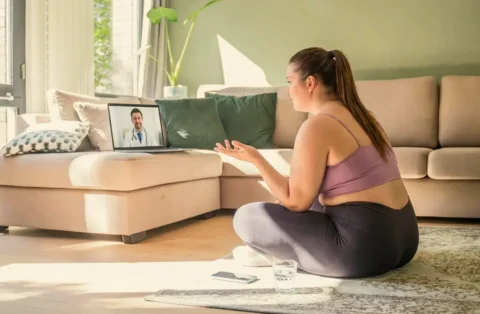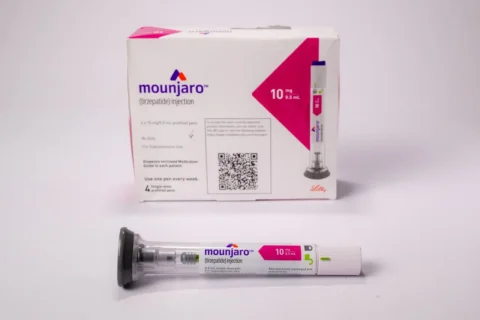What you’ll learn
We’ll explain how GLP-1 medications like Ozempic® can affect your gallbladder, what the research shows about gallstone risk, and important considerations if you’ve had gallbladder surgery. You’ll also learn how QuickMD can support your treatment journey.
You’ve been losing weight successfully on Ozempic® or another GLP-1 medication, but lately you’re feeling some discomfort in your upper-right abdomen. If you’re wondering whether it could be related to your medication, you’re not alone in having that concern. While gallbladder issues can happen with these medications, the vast majority of people never experience these problems.
Weight loss medications like Ozempic® have transformed how we treat diabetes and obesity for millions of people. While emerging research shows they can sometimes increase gallbladder risk, understanding this connection helps you stay informed and empowered, not worried.
We’ve helped thousands of patients navigate GLP-1 treatments safely, keeping an eye out for any potential issues along the way. Whether you’re just starting these medications, dealing with side effects, or have specific concerns about gallbladder health, we’re here to provide you with expert insights so you can stay informed.
How do GLP-1 medications affect your gallbladder?
Your gallbladder is a small organ tucked beneath your liver that stores bile, a digestive fluid your liver produces to break down fats. When you eat, especially fatty foods, your gallbladder contracts and releases bile into your small intestine.
GLP-1 medications like Ozempic® act like a natural hormone called glucagon-like peptide-1. This hormone helps with regulating blood sugar levels, curbing appetite, and affects how your digestive system functions.
Here’s how these medications can sometimes impact your gallbladder:
- Slowed Digestion: GLP-1 drugs deliberately slow down how quickly food moves through your stomach. While this helps you feel full longer and is key to their effectiveness, it can also influence the timing and flow of bile from your gallbladder.
- Reduced Gallbladder Movement: When digestion slows, your gallbladder may not contract as frequently. This can cause bile to sit longer in the gallbladder, becoming more concentrated.
- Rapid Weight Loss: Many people lose weight successfully on these medications. While that’s often the goal, rapid weight loss itself is a well-known risk factor for gallstone formation in any situation.
- Changed Bile Composition: When you lose weight rapidly, your liver may secrete extra cholesterol into bile. If there’s too much cholesterol relative to other substances, it can sometimes crystallize and form stones.
Can Ozempic® cause gallstones? What the research shows
Let’s start with the good news. The vast majority of people on GLP-1 medications never have gallbladder issues. And when problems do pop up, they’re typically very treatable with great outcomes.
We now have much better data on gallbladder risks thanks to some major research studies in JAMA Internal Medicine that looked at thousands of patients. Researchers looked at 76 studies involving over 103,000 patients. They found that people taking GLP-1 medications had a “37% increased relative risk” of gallbladder problems compared to those not taking the medication.
A “37% increased risk” sounds scary until you see the actual numbers. Out of 10,000 people taking these medications for a year, only about 27 more would develop gallbladder-related issues than those not taking them.
Put simply, your chances remain very small.
In clinical studies, only 1.5% of people using the lower dose and 0.4% using the higher dose developed gallstones. To put that in perspective, that’s roughly 1-2 people out of every 100. Meanwhile, none of the people taking a fake pill (placebo) in the same studies developed gallstones.
About 90% of people who got gallstones needed gallbladder removal, which is a routine, safe procedure that most people recover from quickly and can then continue their health journey.
The risk increases with:
- Higher doses of medication
- Longer treatment duration (especially beyond 26 weeks)
- Using the medication primarily for weight loss rather than for diabetes
- Very rapid weight loss
That same study showed that 47% of acute gallbladder inflammation cases occurred within the first 90 days of starting treatment, which means early monitoring is vital.
What are gallstones?
Gallstones are hard deposits that form in your gallbladder when bile becomes imbalanced.
There are two main types:
- Cholesterol stones (about 80% of cases): Yellow-green stones made of hardened cholesterol. These form when your liver puts too much cholesterol into bile, and it can’t stay dissolved.
- Pigment stones: Smaller, darker stones made of bilirubin, a substance from broken-down red blood cells. You’ll see these linked to certain medical conditions like liver disease or blood disorders.
Many people with gallstones have no symptoms. These are called “silent” stones. But when stones block bile ducts, they can cause pain and require treatment.
Ozempic® gallstone symptoms and warning signs to watch for
Being aware of potential symptoms isn’t meant to worry you; it’s meant to empower you to get prompt care if needed, which leads to better outcomes.
If you’re taking a GLP-1 medication, these are the gallbladder symptoms to be aware of:
- Severe abdominal pain: Sharp, intense pain in your upper right abdomen that may radiate to your back or right shoulder blade. This pain often comes in waves and can last from minutes to hours.
- Nausea and vomiting: Especially if accompanied by abdominal pain.
- Fever and chills: These may indicate gallbladder inflammation (cholecystitis) or infection.
- Jaundice: Yellowing of your skin or the whites of your eyes, which suggests a stone may be blocking your bile duct.
- Clay-colored stools: Pale or gray stools can indicate blocked bile flow.
- Dark urine: Another sign that bile isn’t flowing properly.
- Pain after eating: Especially after fatty meals, which trigger gallbladder contractions.
If you experience abdominal pain, fever, or signs of jaundice, seek medical attention promptly. These symptoms are treatable when caught early.
Gallbladder removal and Ozempic®
If gallbladder problems do develop while you’re on Ozempic® or a similar medication, your doctor might recommend having your gallbladder removed (cholecystectomy) to prevent any severe complications.
Naturally, this brings up questions about what happens with your medication. When to stop it, when you can restart, and whether it’s even safe to continue. The good news is that most of these concerns have encouraging answers.
Before surgery: Should you stop your GLP-1 medication?
Your surgical team might ask you to pause your Ozempic® about a week before your procedure, but this depends entirely on your individual situation and risk factors.
GLP-1 medications slow down how quickly your stomach empties, which means food can linger longer than usual. During surgery with anesthesia, having food still in your stomach can create some safety concerns. So, stopping temporarily is just a precaution to keep you as safe as possible.
After surgery: When can you restart Ozempic®?
You can typically resume GLP-1 medications after gallbladder removal, and many people do so successfully.
Why waiting makes sense: Both gallbladder surgery and GLP-1 medications can cause similar digestive symptoms, like nausea, diarrhea, and abdominal discomfort. Your provider may suggest waiting until post-surgery symptoms improve before restarting to avoid confusion about what’s causing any discomfort.
Gradual restart: When you resume, your doctor may recommend starting at a lower dose and gradually increasing based on how you tolerate it.
Why it’s generally safe: There aren’t any documented dangers of taking Ozempic® without a gallbladder. Your liver continues producing bile after gallbladder removal. It just flows directly into your small intestine instead of being stored. Most people attune well to this change.
Can you take Ozempic® without a gallbladder?
Absolutely. Plenty of people continue their GLP-1 medications successfully after gallbladder surgery, with the right medical guidance.
The medications are still safe after your gallbladder is removed, though you might notice some digestive changes at first that are worth paying attention to.
What to expect:
- You may be more sensitive to digestive side effects at first
- You’ll likely start with lower doses
- Regular monitoring helps make sure you’re tolerating the medication well
- Some people need dietary adjustments to manage fat digestion
Documented cases show patients successfully treated with GLP-1 medications for 8+ months after gallbladder removal, with good outcomes.
The key is working with healthcare providers who understand both your surgical history and these medications’ effects.
Who’s at higher risk for Ozempic® gallbladder problems?
While gallbladder problems can happen to anyone taking GLP-1 medications, certain factors may increase your risk.
Having these risk factors doesn’t disqualify you from these medications. It just means your provider will want to keep a closer eye on things.
Demographic factors:
- Being female (women are more prone to gallstones generally)
- Age over 40
Medical factors:
- Very rapid weight loss
- Personal or family history of gallbladder disease
- Certain genetic variations affecting fat metabolism
Medication factors:
- Higher doses of GLP-1 medications
Remember, even with multiple risk factors, serious problems remain uncommon, and your provider can help you weigh the benefits against potential risks.
How to reduce gallbladder risk while taking Ozempic®
You can’t eliminate gallbladder risk entirely, but several strategies may help minimize it:
Gradual weight loss: If possible, aim for steady, moderate weight loss rather than very rapid drops. Work with a QuickMD provider to find the right medication dose that promotes healthy weight loss at a sustainable pace.
Stay hydrated: Proper hydration helps keep bile flowing and may reduce concentration.
Don’t skip meals: Regular eating helps your gallbladder contract and empty bile properly.
Monitor symptoms: Early awareness of gallbladder symptoms allows for prompt treatment, which leads to better outcomes.
Regular check-ins: Stay in touch with your QuickMD provider, especially during the first few months of treatment when monitoring is most important.
Want more tips on safe Ozempic usage? Visit our Learning Center for the latest information on GLP-1 weight loss medications, including Ozempic® and Wegovy®.
QuickMD: your partner in safe GLP-1 treatment
Managing weight loss medications isn’t something you should do alone. We know these treatments work best when you have knowledgeable support every step of the way, from your first consultation through months of successful treatment.
That’s why we give you easy access to licensed providers that know all about Ozempic® and other GLP-1s and how they fit into your health.
What we offer:
- Comprehensive evaluation for GLP-1 eligibility
- Personalized dosing strategies that minimize side effects of Ozempic®
- Regular monitoring for effectiveness and safety
- Guidance on managing common side effects
- Coordination with other specialists when needed
Patients choose QuickMD because we make expert GLP-1 care accessible and affordable. Our licensed providers have extensive experience with these medications and understand the nuances of medical treatment.
Final thoughts on Ozempic® and gallbladder health
The vast majority of people do really well on Ozempic® and other GLP-1 medications and see great results. These medications have helped millions of people achieve better health, manage diabetes, and lose weight successfully.
Yes, gallbladder complications can happen, but they’re totally manageable when you know what to watch for and have good medical support. Most people who develop gallbladder issues recover completely and often go right back to their weight loss journey.
The key is staying informed without letting worry keep you from getting treatment that could really help. Catching any gallbladder problems early makes all the difference in keeping you healthy and on track with your goals.
Notice any concerning symptoms? Don’t wait it out or worry in silence. Our urgent care team can help you figure out what’s going on and get you the right care. Don’t hesitate to reach out if you’re experiencing symptoms and need guidance.
Frequently asked questions about Ozempic® and your gallbladder
Will eating a low-fat diet while on Ozempic® prevent gallbladder problems?
While a low-fat diet can help reduce symptoms if gallbladder issues do develop, there’s no solid evidence that it actually prevents gallstone formation in people taking Ozempic®. The gallbladder effects seem to be more about how these medications change digestion and bile flow rather than just what you’re eating. That said, a balanced diet supports your overall health and may help with some of the digestive side effects people sometimes experience.
If I develop gallbladder pain while on Ozempic®, will stopping the medication make the pain go away?
Unfortunately, stopping Ozempic® won’t make existing gallstones or gallbladder inflammation disappear or give you instant pain relief. At that point, you’re dealing with a physical problem that needs medical attention, whether you stay on the medication or not.
Stopping might help prevent things from getting worse, but it won’t fix what’s already happening. If you’re having gallbladder pain, the most important thing is getting checked out right away to figure out what’s going on and what kind of treatment you need.
Are there any warning signs before severe gallbladder pain hits?
Some people notice subtle signs before serious gallbladder issues occur, like feeling bloated after eating, especially fatty foods, or having some mild discomfort in the upper right part of their belly that comes and goes.
You might also notice feeling unusually full or nauseous after meals. These aren’t always gallbladder-related, but if you’re noticing new digestive issues on Ozempic®, it’s worth mentioning to your QuickMD provider.




